Contact
us
for more information
about Pat and her art.
For
questions or
comments about this
site, click here.
Ciao friends for the last time during this stay in Italia. This is a long letter because there is much to tell before leaving for home. Next weeks letter will be shorter, I promise you.
This week has been the week of The Archidado celebration that dates from 1325. Our family has been active in the activities.
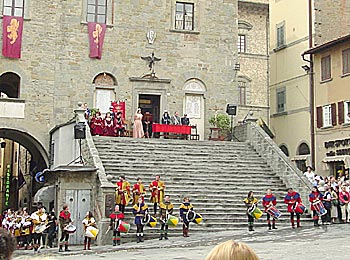
The City Hall. Becky at the top of the steps, Beniameno is the first
trumpeter and Martina is the drummer in front of him.
Each of the five communes into which the city is divided has an annual obligation to donate four pounds of wax in honor of Santa Margarita. On Saturday, Sofi and Michi, walking hand in hand with their young male escorts, were part of the procession that carried their commune's wax to the City Hall in the Palazza Comunale. Becky, wearing a splendid medievil style dress was la interprete di i stranieri (the interpreter for the foreigners). She stood with the city dignatories at the top of the steps leading to the city hall.
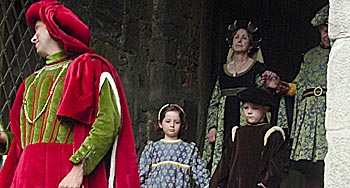
Michela and her escort.
At the bottom of the steps Roberto's brother in law, Beniamino, and two other trumpeters heralded the arrival of each procession and Beniamino's daughter, Martina, rolled out drum beats along with a dozen other drummers. All the performers were in period costume and were well rehearsed. It was fascinating to see the reenactment of such an old tradition.
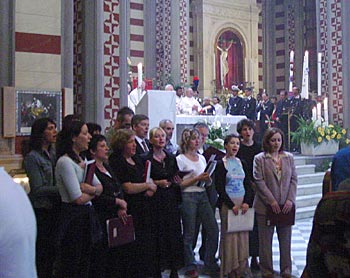
Becky, second from the right singing at the Sunday morning service
for Santa Margarita.
On Sunday morning we attended service in the church of Santa Margarita, where Becky is a member of the choir. I wish I could have recorded the choir's singing for you. The Italian language is even more beautiful on the ear when sung, whether it be by one their great tenors or by a talented choir.
Earlier, Becky had told us of the life of Margarita, who had been born in Laviano, a two days walk from Cortona. Margarita grew to be a beautiful girl and won the heart of a young nobleman who took her into his household. Because she was not of noble blood, the two lovers could not be married but nevertheless they lived happily until one day the nobleman's dog returned home alone. The dog led Margarita to the body of her nobleman, horribly beaten to death.
Margarita went first to her old home but her parents drove her away, saying she had dishonored the family. Eventually she came to Cortona and was given food and shelter by the nuns in return for work. The nuns soon found Margarita had an ability to cure the sick that bordered on the miraculous. One winter's day a group of wealthy visitors donated money to the convent. That evening Margarita fed them fresh cherries, a miracle for sure, for how else could she find cherries in the depth of winter? Other miracles followed and the citizens of Cortona began to look to her for guidance. For the rest of her life she used her influence for the benefit of the poor and when she died, her body was preserved and placed on the alter of a church that was given her name.
During Sunday's service, I, along with countless others, filed past the alter with its glass window behind which lies the saint. Her skin is still intact and her gentle appearance reminded me of how mother looked on the night of her death.
On Sunday afternoon, Malcolm's youngest son, Hugo and his wife, Ros, arrived from London for a two day visit, prior to starting a vacation on the Northern Italian Lakes. Their first baby is due in August. Yesterday Hugo drove us across the valley to Monte Pulciano, an ancient hilltop city surrounded by vineyards, where he and Ros bought wines to take to England. Beautiful as Monte Pulciano is, it cannot compare with the charm of Cortona.
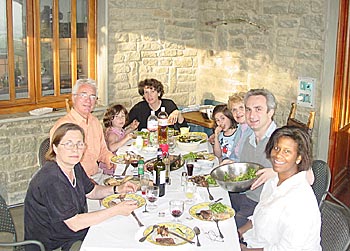
Dinner on the patio with Hugo and Ros.
Back on this side of the valley, Becky, Roberto, Ros, Hugo, Malcolm and I visited Restaurante Corys for dinner. Again, Guseppe orchestrated a superb meal. After generous appetizers of various fish, we were served a gnocchi pasta with salmon, followed by a fettucine pasta with bottarga (smoked and cooked fish roe). The main course included lobster, langostine and giant shrimp. You would have expected us to feel ill all night but no, we all slept soundly.
This has been a wonderful month with my Italian family, blessed with the happiest of experiences. The Tuscan colors have warmed my heart and enriched my painter's palette. I am returning to Virginia with renewed energies. Next week I will be giving you the latest news from the Foundation and its continuing progress in promoting and developing the use of art in the teaching of children with special education needs. On Saturday night, Malcolm and I will be hosting a dinner for the board members and their spouses at the Barn. I am looking forward to what I am sure will be an inspiring weekend.
The following Friday I meet with my Iowan friends in Ames for the Society dinner in aid of the Foundation.
Arrivederci! A settimana! (until next week)
Love,
Pat
For those who want to read more, I have something to say about olive trees and trains.
There are three olive trees in my terrace garden and Roberto thinks I should cut down two of them and plant red maples to provide better shade. I have said no, even though red maples would remind me of Virginia.
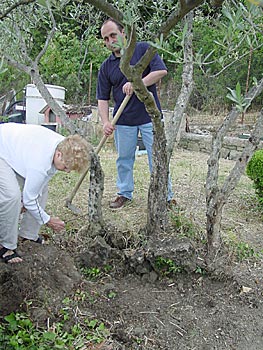
Pat and Roberto at the threatened olive tree.
The more I learn about the olive trees, the more I respect them for their silver green leaves that are the shape of miniature Maasi spearheads.
To destroy an olive tree is to end a dynasty. The trunks and branches of my trees are relatively young but the knargled blocks of root from which each grows, have lived on in this soil for generations. Some claim that the trees on The Mount of Olives, in Jerusalem, are more than 2000 years old.
I have mentioned before my surprise at how much olive oil the Italians consume. I have long followed their habit of putting a small pool of oil on my side plate at dinner, sprinkling it with salt and pepper and then dipping my bread. Becky told me the origin of this Italian habit. The Italians do not use salt or butter in their bread making and the salted olive oil provides the missing flavor.
Thomas Jefferson once said, "the olive tree is surely the richest gift of heaven." Maybe he knew this trick with the bread. Oops! I hope Michael, my doctor, doesn't read this. Bread is not part of my diet but then you would have to be super determined not to touch the bread at an Italian dinner table.
I have read that if we Americans were to use olive oil in all our cooking, the instances of breast cancer would be halved. Being a breast cancer survivor and having lost dear friends to this disease, I know well the depths of mental and physical devastation this cancer causes. I am commited to the use of olive oil.
There are many other health benefits attributed to this tree that has been cultivated for more than 4000 years and has played part in the ceremonies of all three middle eastern religions, Christianity, Judism and Islam. If you enter "olive tree" in your Internet search engine you will meet with many olive enthusiasts.
I have a life time affinity with trains. Grandpop Buckley was an enginer on The Baltimore Ohio Railroad before becoming a driver on the Staten Island Rapid Transit, a passenger train running the length of the Island, from St. George to Tottenville. When I was old enough, I would take his lunch to the Great Kills station and wait for his train. As the train pulled up, he would reach down from his cab and take the lunch pail from my outstrectched arms.
The summer house Mom bought in Millrift, with her dress designing earnings, was only fifty feet above the B & O Railroad. At night the vibrations from the passing trains shook my bed. In the daytime, we children would wave to the engineers who gave us a blast or two on the whistle in response. My children and my grandchildren did the same until Mom died and we sold the house.
I have always found comfort in the sound of a passing train. For me it is a symbol of strengh and dependability and tells that all is well. At the Barn in Waynesboro, I hear the busy chatter of the freight train that passes on the far side of the valley in the early hours of each day. As the engine approaches the railroad crossing, the driver sounds two double blasts on the whistle. I hear them in my half sleep and know there is another hour before I need to leave my bed.
Many trains pass below me in the Val di Chiana (Keeana). The valley is rich in history and has seen countless armies march its length, heading to or from Rome. Etruscans, Romans and Carthaginians trod the road where now a main railwayline links Rome with Milan and onwards North to other cities of Europe.
Sounds of the trains carry up the hillside. The expresses speed past our little station of Camucia without change of pace. They are A types with hearts working hard and minds always conscious they must not lose a minute. When a local train approaches, the tempo is relaxed and I listen as it slows to a halt and brings long moments of silence. The local trains have a tendancy to be a little late but you allow for that and travel with a book. With binoculars I can follow the trains from my seat in the garden until they disappear amongst the houses of Terontola, on the edge of Lake Trasimeno. There a branch line heads South West to Perugia and on to Assi, the home of St. Francis, my favorite Saint.
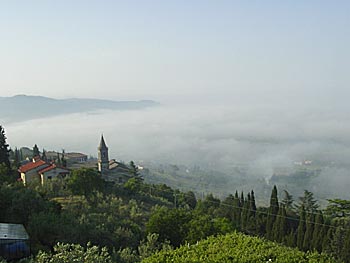
Hannibal and his soldiers laid in ambush beneath the morning mist
(photo taken from Pat's house).
It was close by Terontola that young Hannibal and his Carthaginians waited for the Roman army as it hurried South to defend Rome. Hidden in early morning lakeside mist, the Carthaginians surprised the Romans, surrounding them and inflicting a heavy defeat.
Much has happened in this valley and from the hills on either side, the olive trees have observed man's wisdom and his folly. I am not going to let anything happen to my three trees.
The Moss Portfolio
HC 69 Box 17118 Poplar Grove Lane
Mathews, VA 23109
(800) 430-1320
©P. Buckley Moss 2003
